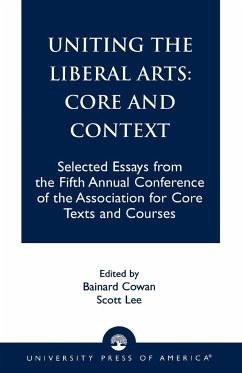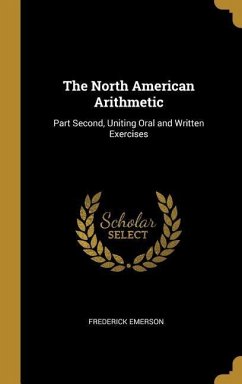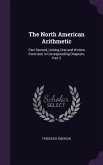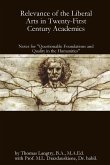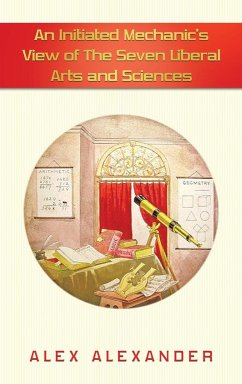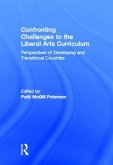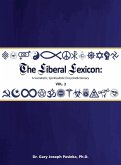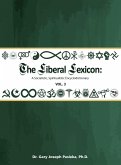Uniting the Liberal Arts
Core and Context : Selected Essays for the Fifth Annual Conference of the Association of Core Texts and Courses
Herausgeber: Cowan, Bainard; Lee, Scott
Uniting the Liberal Arts
Core and Context : Selected Essays for the Fifth Annual Conference of the Association of Core Texts and Courses
Herausgeber: Cowan, Bainard; Lee, Scott
- Broschiertes Buch
- Merkliste
- Auf die Merkliste
- Bewerten Bewerten
- Teilen
- Produkt teilen
- Produkterinnerung
- Produkterinnerung
Uniting the Liberal Arts: Core and Context is a selection of essays, presented or further developed from the 1999 Association of Core Texts and Courses conference in New Orleans, focusing on a few of the vertices or vortices, where an intensified sense of the interplay between the ways of knowledge may be glimpsed, or a memorable moment in the past when all briefly achieved a greater congruity may be revived for new consideration. These essays fall into an organization according to the major scheme each posits as unifying, or attempting to unify, the liberal arts.
Andere Kunden interessierten sich auch für
![The North American Arithmetic: Part Second, Uniting Oral and Written Exercises The North American Arithmetic: Part Second, Uniting Oral and Written Exercises]() Frederick EmersonThe North American Arithmetic: Part Second, Uniting Oral and Written Exercises29,99 €
Frederick EmersonThe North American Arithmetic: Part Second, Uniting Oral and Written Exercises29,99 €![The North American Arithmetic: Part Second, Uniting Oral and Written Exercises in Corresponding Chapters, Part 2 The North American Arithmetic: Part Second, Uniting Oral and Written Exercises in Corresponding Chapters, Part 2]() Frederick EmersonThe North American Arithmetic: Part Second, Uniting Oral and Written Exercises in Corresponding Chapters, Part 230,99 €
Frederick EmersonThe North American Arithmetic: Part Second, Uniting Oral and Written Exercises in Corresponding Chapters, Part 230,99 €![Relevance of the Liberal Arts in Twenty-First Century Academics Relevance of the Liberal Arts in Twenty-First Century Academics]() Thomas LangtryRelevance of the Liberal Arts in Twenty-First Century Academics11,99 €
Thomas LangtryRelevance of the Liberal Arts in Twenty-First Century Academics11,99 €![An Initiated Mechanic's View of the Seven Liberal Arts and Sciences An Initiated Mechanic's View of the Seven Liberal Arts and Sciences]() Alex AlexanderAn Initiated Mechanic's View of the Seven Liberal Arts and Sciences24,99 €
Alex AlexanderAn Initiated Mechanic's View of the Seven Liberal Arts and Sciences24,99 €![Confronting Challenges to the Liberal Arts Curriculum Confronting Challenges to the Liberal Arts Curriculum]() Confronting Challenges to the Liberal Arts Curriculum117,99 €
Confronting Challenges to the Liberal Arts Curriculum117,99 €![The Liberal Lexicon The Liberal Lexicon]() Gary J PasiekaThe Liberal Lexicon64,99 €
Gary J PasiekaThe Liberal Lexicon64,99 €![The Liberal Lexicon The Liberal Lexicon]() Gary J PasiekaThe Liberal Lexicon69,99 €
Gary J PasiekaThe Liberal Lexicon69,99 €-
-
-
Uniting the Liberal Arts: Core and Context is a selection of essays, presented or further developed from the 1999 Association of Core Texts and Courses conference in New Orleans, focusing on a few of the vertices or vortices, where an intensified sense of the interplay between the ways of knowledge may be glimpsed, or a memorable moment in the past when all briefly achieved a greater congruity may be revived for new consideration. These essays fall into an organization according to the major scheme each posits as unifying, or attempting to unify, the liberal arts.
Produktdetails
- Produktdetails
- Verlag: University Press of America
- Seitenzahl: 228
- Erscheinungstermin: 18. Dezember 2001
- Englisch
- Abmessung: 216mm x 140mm x 14mm
- Gewicht: 328g
- ISBN-13: 9780761821618
- ISBN-10: 0761821619
- Artikelnr.: 31201353
- Herstellerkennzeichnung
- Libri GmbH
- Europaallee 1
- 36244 Bad Hersfeld
- gpsr@libri.de
- Verlag: University Press of America
- Seitenzahl: 228
- Erscheinungstermin: 18. Dezember 2001
- Englisch
- Abmessung: 216mm x 140mm x 14mm
- Gewicht: 328g
- ISBN-13: 9780761821618
- ISBN-10: 0761821619
- Artikelnr.: 31201353
- Herstellerkennzeichnung
- Libri GmbH
- Europaallee 1
- 36244 Bad Hersfeld
- gpsr@libri.de
Edited by Bainard Cowan and Scott Lee - Contributions by Stephen Zelnick; Eva Brown; Gregory Marks; Dana Densmore; Lucy Melbourne; Michael Hinz; Robert J. McMahon; Harvey Shulman; James F. Walter; Joan L. Richards; William Franke; Dennis L. Sepper; Virgin
Chapter 1 Preface
Chapter 2 Acknowledgments
Chapter 3 Practically Educated: The ACTC Director's Address
Chapter 4 On Education: Uniting Students' Learning
Chapter 5 Waiting for Herot to Burn: The Core Vision of Beowulf
Chapter 6 The Rewards of Reading Copernicus
Chapter 7 (Re)discovering the Rationale for a Liberal Arts Core: Narrative
of the Life of Frederick Douglass in Interdisciplinary Context
Chapter 8 Knowledge, History, and the Creation of Human Nature
Chapter 9 Teaching Students to Ask Questions About What They Read
Chapter 10 Educating the Educators: Core Curriculum and Peripheral Faculty
Chapter 11 From Wandering to Journeying with Core Texts in an Honors
Curriculum
Chapter 12 Acts of Reading:
Chapter 13 Euclid Through Ages of Reason
Chapter 14 The Interpretive Journey and the Allegory of Reading:
Introduction to the Inferno as a Humanities Text
Chapter 15 Prospero and the Times of Reading
Chapter 16 Character and Reading: The Absent Speaker's Presence
Chapter 17 Texts as Gathering Points:
Chapter 18 At the Core of the Social Sciences: Montesquieu's Spirit of the
Laws
Chapter 19 Teaching the Bhagavad-Gita in a Traditional Great Books Program
Chapter 20 Confucius in Dialogue with the West and Today's Students
Chapter 21 History in the Service of Life: A Dynamic Systems Approach to
Intellectual History
Chapter 22 What the Classics of Science Can Teach Us: Claude Bernard's
Introduction to the Study of Experimental Medicine and Erwin Schrödinger's
What Is Life?
Chapter 23 The Ethical:
Chapter 24 Tragedy, History, and Rhetoric in the Core: Sophocles and
Thucydides
Chapter 25 Adam Smith's Other Great Book: The Theory of Moral Sentiments
Chapter 26 Questioning "Our Western Tradition"
Chapter 27 Core Events as "Core" Context: The Holocaust as a Test Case
Chapter 28 The City:
Chapter 29 The Holy City
Chapter 30 Dante and the Synthesis of the Medieval City
Chapter 31 Shakespeare's Cities
Chapter 32 Unraveling the City: "Bartleby" and the Mid-Nineteenth Century
Chapter 33 The City in Toni Morrison's Paradise
Chapter 2 Acknowledgments
Chapter 3 Practically Educated: The ACTC Director's Address
Chapter 4 On Education: Uniting Students' Learning
Chapter 5 Waiting for Herot to Burn: The Core Vision of Beowulf
Chapter 6 The Rewards of Reading Copernicus
Chapter 7 (Re)discovering the Rationale for a Liberal Arts Core: Narrative
of the Life of Frederick Douglass in Interdisciplinary Context
Chapter 8 Knowledge, History, and the Creation of Human Nature
Chapter 9 Teaching Students to Ask Questions About What They Read
Chapter 10 Educating the Educators: Core Curriculum and Peripheral Faculty
Chapter 11 From Wandering to Journeying with Core Texts in an Honors
Curriculum
Chapter 12 Acts of Reading:
Chapter 13 Euclid Through Ages of Reason
Chapter 14 The Interpretive Journey and the Allegory of Reading:
Introduction to the Inferno as a Humanities Text
Chapter 15 Prospero and the Times of Reading
Chapter 16 Character and Reading: The Absent Speaker's Presence
Chapter 17 Texts as Gathering Points:
Chapter 18 At the Core of the Social Sciences: Montesquieu's Spirit of the
Laws
Chapter 19 Teaching the Bhagavad-Gita in a Traditional Great Books Program
Chapter 20 Confucius in Dialogue with the West and Today's Students
Chapter 21 History in the Service of Life: A Dynamic Systems Approach to
Intellectual History
Chapter 22 What the Classics of Science Can Teach Us: Claude Bernard's
Introduction to the Study of Experimental Medicine and Erwin Schrödinger's
What Is Life?
Chapter 23 The Ethical:
Chapter 24 Tragedy, History, and Rhetoric in the Core: Sophocles and
Thucydides
Chapter 25 Adam Smith's Other Great Book: The Theory of Moral Sentiments
Chapter 26 Questioning "Our Western Tradition"
Chapter 27 Core Events as "Core" Context: The Holocaust as a Test Case
Chapter 28 The City:
Chapter 29 The Holy City
Chapter 30 Dante and the Synthesis of the Medieval City
Chapter 31 Shakespeare's Cities
Chapter 32 Unraveling the City: "Bartleby" and the Mid-Nineteenth Century
Chapter 33 The City in Toni Morrison's Paradise
Chapter 1 Preface
Chapter 2 Acknowledgments
Chapter 3 Practically Educated: The ACTC Director's Address
Chapter 4 On Education: Uniting Students' Learning
Chapter 5 Waiting for Herot to Burn: The Core Vision of Beowulf
Chapter 6 The Rewards of Reading Copernicus
Chapter 7 (Re)discovering the Rationale for a Liberal Arts Core: Narrative
of the Life of Frederick Douglass in Interdisciplinary Context
Chapter 8 Knowledge, History, and the Creation of Human Nature
Chapter 9 Teaching Students to Ask Questions About What They Read
Chapter 10 Educating the Educators: Core Curriculum and Peripheral Faculty
Chapter 11 From Wandering to Journeying with Core Texts in an Honors
Curriculum
Chapter 12 Acts of Reading:
Chapter 13 Euclid Through Ages of Reason
Chapter 14 The Interpretive Journey and the Allegory of Reading:
Introduction to the Inferno as a Humanities Text
Chapter 15 Prospero and the Times of Reading
Chapter 16 Character and Reading: The Absent Speaker's Presence
Chapter 17 Texts as Gathering Points:
Chapter 18 At the Core of the Social Sciences: Montesquieu's Spirit of the
Laws
Chapter 19 Teaching the Bhagavad-Gita in a Traditional Great Books Program
Chapter 20 Confucius in Dialogue with the West and Today's Students
Chapter 21 History in the Service of Life: A Dynamic Systems Approach to
Intellectual History
Chapter 22 What the Classics of Science Can Teach Us: Claude Bernard's
Introduction to the Study of Experimental Medicine and Erwin Schrödinger's
What Is Life?
Chapter 23 The Ethical:
Chapter 24 Tragedy, History, and Rhetoric in the Core: Sophocles and
Thucydides
Chapter 25 Adam Smith's Other Great Book: The Theory of Moral Sentiments
Chapter 26 Questioning "Our Western Tradition"
Chapter 27 Core Events as "Core" Context: The Holocaust as a Test Case
Chapter 28 The City:
Chapter 29 The Holy City
Chapter 30 Dante and the Synthesis of the Medieval City
Chapter 31 Shakespeare's Cities
Chapter 32 Unraveling the City: "Bartleby" and the Mid-Nineteenth Century
Chapter 33 The City in Toni Morrison's Paradise
Chapter 2 Acknowledgments
Chapter 3 Practically Educated: The ACTC Director's Address
Chapter 4 On Education: Uniting Students' Learning
Chapter 5 Waiting for Herot to Burn: The Core Vision of Beowulf
Chapter 6 The Rewards of Reading Copernicus
Chapter 7 (Re)discovering the Rationale for a Liberal Arts Core: Narrative
of the Life of Frederick Douglass in Interdisciplinary Context
Chapter 8 Knowledge, History, and the Creation of Human Nature
Chapter 9 Teaching Students to Ask Questions About What They Read
Chapter 10 Educating the Educators: Core Curriculum and Peripheral Faculty
Chapter 11 From Wandering to Journeying with Core Texts in an Honors
Curriculum
Chapter 12 Acts of Reading:
Chapter 13 Euclid Through Ages of Reason
Chapter 14 The Interpretive Journey and the Allegory of Reading:
Introduction to the Inferno as a Humanities Text
Chapter 15 Prospero and the Times of Reading
Chapter 16 Character and Reading: The Absent Speaker's Presence
Chapter 17 Texts as Gathering Points:
Chapter 18 At the Core of the Social Sciences: Montesquieu's Spirit of the
Laws
Chapter 19 Teaching the Bhagavad-Gita in a Traditional Great Books Program
Chapter 20 Confucius in Dialogue with the West and Today's Students
Chapter 21 History in the Service of Life: A Dynamic Systems Approach to
Intellectual History
Chapter 22 What the Classics of Science Can Teach Us: Claude Bernard's
Introduction to the Study of Experimental Medicine and Erwin Schrödinger's
What Is Life?
Chapter 23 The Ethical:
Chapter 24 Tragedy, History, and Rhetoric in the Core: Sophocles and
Thucydides
Chapter 25 Adam Smith's Other Great Book: The Theory of Moral Sentiments
Chapter 26 Questioning "Our Western Tradition"
Chapter 27 Core Events as "Core" Context: The Holocaust as a Test Case
Chapter 28 The City:
Chapter 29 The Holy City
Chapter 30 Dante and the Synthesis of the Medieval City
Chapter 31 Shakespeare's Cities
Chapter 32 Unraveling the City: "Bartleby" and the Mid-Nineteenth Century
Chapter 33 The City in Toni Morrison's Paradise

